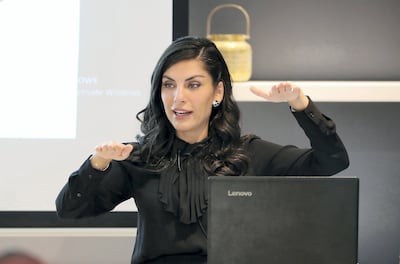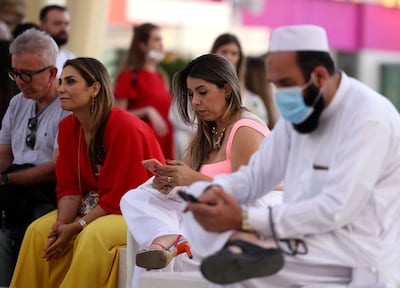No-mask anxiety is the latest in a number of disorders reported by psychologists dealing with the fallout from the Covid-19 pandemic.
After more than two and a half years of mandatory face masks in public, restrictions were eased this week in the UAE — but the change has left some struggling to readjust.
The decision to remove face masks was taken due to falling numbers of Covid-19 and milder symptoms reported in current cases.
A welcome change for many but psychologists said it could take time for some to get used to the mask-free environment.
“Some people, especially those who may not be ready to have the masks removed yet, may feel powerless to circumstances out of their control,” said Dr Saliha Afridi, clinical psychologist and managing director of The Lighthouse Arabia, a mental health and wellness centre in Dubai.
“These people will most likely experience bouts of elevated anxiety.
“Most others may find themselves feeling more agitated, stressed, irritable, during such times, not realising that change of any sort can make a person feel destabilised for a few weeks.

“As with any change, there is a transition from one way of doing things to the other and one can expect difficult feelings as they adjust to the new.
“During transition periods, which typically last six weeks, one can expect many feelings and symptoms of stress and anxiety.”
Masks still required at times
Although a mandate remains in place for public transport, places of worship and healthcare environments, most other places like schools, malls and workplaces have scrapped restrictions.
Doctors recommend that those with symptoms of cold and flu continue to wear masks, to limit the number of viral infections of seasonal colds this winter.
Since the outbreak of coronavirus, rates of anxiety in the UAE have increased experts said.
Symptoms include rapid heart rate or pressure in the chest, restlessness, feeling agitated and irritable, excess worry, tense muscles, being unable to sleep or experiencing panic attacks.
Mental health professionals at the Priory Wellbeing Centres in Dubai and Abu Dhabi reported a 20 per cent increase in those seeking treatment since Covid was first detected.
According to consultant psychiatrist Dr Waleed Ahmed, many are still coming to terms with the after-effects.
“From my own team’s clinical experience, there has been an increase in the presentation of anxiety disorders in otherwise well or low-risk people,” said Dr Ahmed.

“We have seen a rise in cases, both during and after the pandemic, especially among children and adolescents.
“There is a common thread among the majority of patients — they were fine until the pandemic started and schools went online.
“Young people have definitely felt the full force of pandemic-related restrictions, such as limited social and physical interaction, excessive digital consumption and, of course, online schooling.
“For many, this has had an immense impact on their mental health, particularly in relation to anxiety and stress levels.”
Social anxiety
A 2021 review of existing research on the impact of mask wearing and social anxiety was explored by the University of Waterloo’s Department of Psychology and Centre for Mental Health Research and Treatment in Ontario, Canada.
Characterised by negative self-image and fear of a failure to conform to society’s norms, social anxiety is apparent in around 10-13 per cent of the population, experts said.
Researchers found those with existing social anxiety were most likely to struggle to readapt to society, once mask wearing was removed from Covid regulations.
The UAE reacted to a well-documented surge in mental health complaints during the pandemic by increasing support services via remote counselling and a telephone support line.
Other social support groups were established to help people readjust to life post-Covid.
One of those was Shore Thing Surf Therapy in Dubai, run by Paula Jacobson.
To mark World Mental Health Day, volunteers from the group will be hosting a surf therapy session at Sunset Beach in Dubai on Sunday, October 9 from 4.30pm to help those with anxiety and depression.
It is one of an increasing number of options to help those with anxiety accrued during Covid.
“The pandemic was a major life event that impacted people on biological, psychological and social levels,” said Dr Ahmed.
“Increasingly, researchers are talking about it as a major trauma in people’s lives and we all have been affected to some extent.”










